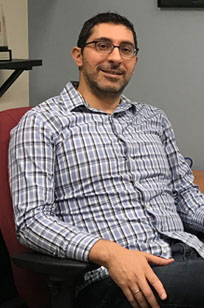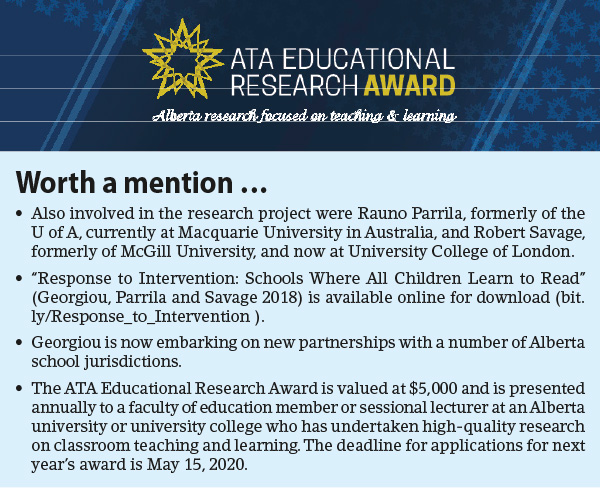Page Content

University of Alberta professor George Georgiou is the recipient of the ATA’s 2019 Educational Research Award.
Photo by Laura Harris
|
The Alberta Teachers’ Association has selected University of Alberta professor George Georgiou as the recipient of its 2019 ATA Educational Research Award.
Georgiou’s award-winning submission was a three-year, dual-site quantitative study conducted in Alberta and Quebec called “Response to Intervention: Schools Where All Children Learn to Read.” It followed a group of students in each province from Grade 1 to Grade 3 (2015–2018) to evaluate the basic assumptions of the Response to Intervention (RtI) model in literacy intervention. It also involved training teachers in best practices and the use of standardized tools for reading assessment.
|
“This line of research is extremely important for two reasons,” said Georgiou, who is also director of the university’s JP Das Centre on Developmental and Learning Disabilities. “One, it enhances our teachers’ capacity by exposing them to instructional approaches that are supported by scientific evidence, and two, it prevents reading difficulties from becoming a lifelong threat to children’s well-being.”
The Alberta site in the study followed 290 students from 11 different schools (all Edmonton Public schools) for the project. Teacher participants were trained in evidence-based practices for teaching reading and provided a database of daily lessons. Students were tested three times each year in October, January and April. The students scoring below the 30th percentile were given intensive, evidence-based intervention by U of A graduate students trained as reading interventionists.
The interventions were done with small groups of three or four students and had different focuses at each grade level. Three 30-minute sessions took place each week over a span of 10 to 12 weeks. Students who continued to struggle in Grade 3 were provided intervention on a one-on-one basis.
At the conclusion of the study only four students who received intervention remained at-risk readers, i.e., a mere 1.4 per cent of the original cohort of 290 students.
Remarkable results
Nellie Carlson School was brand new when its four Grade 2 classes joined the other 10 schools for the second and third years of the study. Three of the four classes had average reading scores that were below the acceptable standard.
“Those same students, followed two years later, are doing really well … they’re well above the norm,” said Nellie Carlson School principal Henry Madsen.
“What’s really important to recognize is that they didn’t improve on the same test they took two years ago, they improved on a norm-referenced scale, which says that they not only have gotten to be better readers, but they have gotten to be better readers based on the norm of the students they are being compared to across North America,” Madsen elaborated. “In other words, the longer they stay with us, the better they do, and they are learning more than a year in a year’s time. It’s remarkable stuff.”
Before Nellie Carlson, Madsen was principal at Ellerslie School, which was one of 10 Edmonton Public schools that participated in the pilot of Georgiou’s own RtI program 10 years ago. Having seen Georgiou’s program deliver positive results for both students and teachers for more than a decade, Madsen is a firm believer in RtI.
“We need to have strong intervention at Division I and I think we’ve got to have every single kid in Grade 3 reading at grade level. Every teacher beyond that benefits,” said Madsen.
In receiving the ATA Educational Research Award, Georgiou gave a lot of credit to the schools, principals and teachers he has worked with over the last 10 years. That number of schools has grown to 25, and he makes it clear he appreciates every single one of them and all they bring to what he calls “a beautiful partnership.”
“You cannot really find this anywhere in the whole world,” Georgiou marveled. “It doesn’t happen anywhere else on the planet.” ❚

